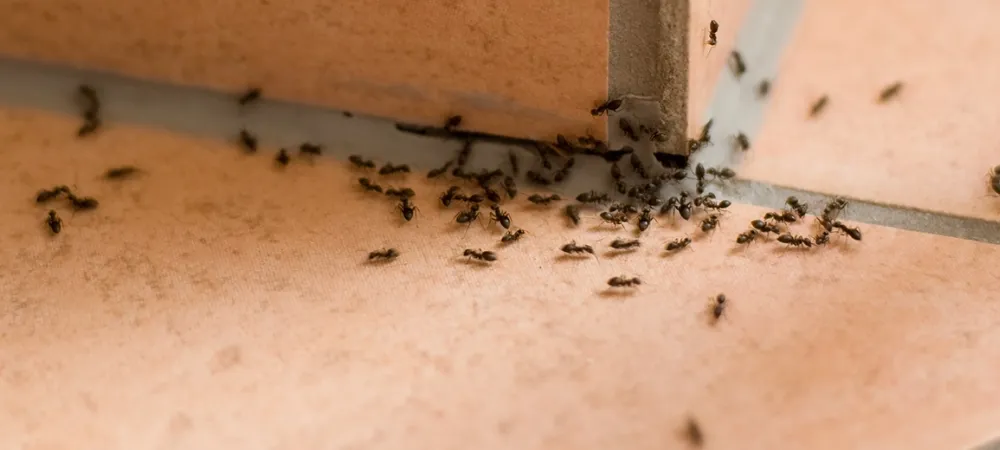How to Get Rid of Ants in Your Kitchen

Table of Contents
Ants in the kitchen are more than just a nuisance—they're a sign that something in your home is attracting them. Fortunately, there are several proven methods to eliminate ants and keep them from returning. This guide walks you through immediate steps for removal, followed by insight into what attracts ants and how to prevent future infestations.
How to Get Rid of Ants in the Kitchen
To deal with ants effectively, start by targeting the problem head-on. The following actions will help eliminate active infestations and disrupt the trail ants are using to reach your kitchen:
1. Clean Thoroughly and Consistently
A clean kitchen is your first and most important line of defense. Ants follow scent trails to food and water sources, so eliminating those attractants is key. Here’s what you should prioritize:
- Wipe down countertops with a vinegar solution or soapy water.
- Sweep and mop floors regularly.
- Clean under appliances and behind trash bins.
- Store food in sealed containers.
- Empty the trash frequently and clean the bin itself.
- Fix leaks around sinks or under cabinets.
2. Identify and Block Entry Points
If ants are getting into your kitchen, they’ve found a path from the outside. Finding and sealing these entry points helps stop new ants from joining the trail. Use the tips below to block off their access:
- Look around baseboards, window sills, plumbing, and electrical lines.
- Use caulk or sealant to close up any cracks or gaps.
3. Use Ant Bait Stations
If you’re seeing long trails of ants, it likely means there’s a larger colony feeding nearby. Rather than just wiping them away, bait stations give worker ants something to carry back to the nest, eventually killing the entire colony. To get the most out of baiting, try the following:
- Place bait stations near ant trails.
- Avoid using repellents that scatter the ants.
- Be patient—baits take time to work as ants bring poison back to the nest.
4. Try Natural Remedies for Minor Problems
For light infestations or as a supplement to baiting, natural solutions can offer extra support without relying on harsh chemicals. While they may not wipe out a colony, they can help disrupt activity and repel new ants. These options are safe to try around most households:
- Spray vinegar or lemon juice on ant trails.
- Use peppermint oil or cinnamon as a natural deterrent.
- Sprinkle food-grade diatomaceous earth near baseboards or under sinks.
What Attracts Ants to Your Kitchen?
Even the cleanest homes can attract ants under the right conditions. Most often, it comes down to food, moisture, or access—all things kitchens provide in abundance. Here are the most common things that draw ants indoors:
- Crumbs and food spills: Even small sugar granules or grease spots can attract ants.
- Pet food: Open bowls or bags are often overlooked attractants.
- Standing water: Leaky faucets, damp sponges, and sink condensation are moisture sources ants need.
- Greasy residues: Cooking oil splatter or unclean stovetops can act like a beacon.
How to Prevent Ants From Coming Back
Once you’ve eliminated the current infestation, prevention becomes the priority. The key is to stay consistent with your habits so ants have no reason—or ability—to return. These strategies will help you maintain a kitchen that’s unappealing to ants:
- Keep your kitchen clean and dry.
- Store pantry items like sugar and cereal in airtight containers.
- Rinse out recyclables before placing them in bins.
- Regularly inspect windows, doors, and walls for new entry points.
- Don’t leave fruit or baked goods uncovered on counters.
- Keep pet feeding areas clean and remove uneaten food promptly.
When to Call a Professional
If DIY methods aren’t solving the problem or the ants keep coming back, it may be time to contact a professional. Our pest control services are designed to eliminate infestations at the source and prevent future activity. Our licensed technicians can:
- Identify the ant species and nesting sites.
- Apply targeted treatments inside and outside your home.
- Set up ongoing protection plans tailored to your needs.
Ant problems in the kitchen won’t go away on their own. With the right combination of cleaning, sealing, baiting, and prevention, you can stop ants at the source and keep your kitchen ant-free for good. If home remedies aren’t enough, don’t wait to get expert help. Contact our team today to get started!
